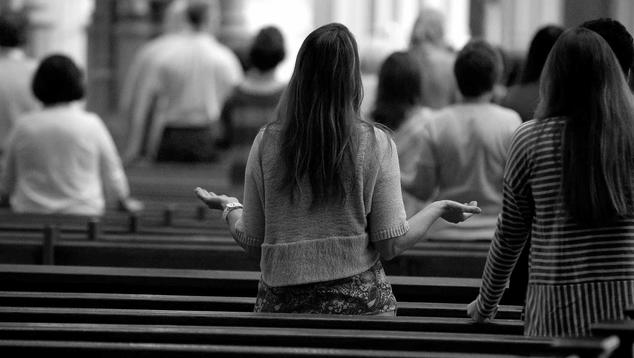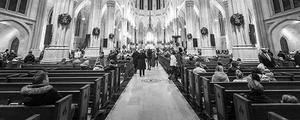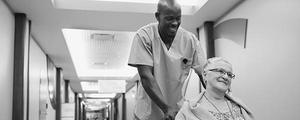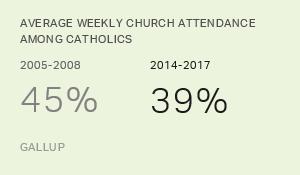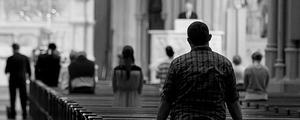Story Highlights
- 31% of Catholics rate the clergy's honesty highly, down from 49% in 2017
- 44% of Catholics confident in organized religion; an 8-point drop
- 52% of Catholics say religion is a "very important" part of their lives
WASHINGTON, D.C. -- Amid turmoil in the Roman Catholic Church in the ongoing fallout from priest sex abuse scandals, a record-low 31% of U.S. Catholics rate the honesty and ethical standards of the clergy as "very high" or "high." This marks an 18-percentage-point drop between 2017 and 2018, when more sexual abuse allegations against priests surfaced and questions arose about the Vatican's response.
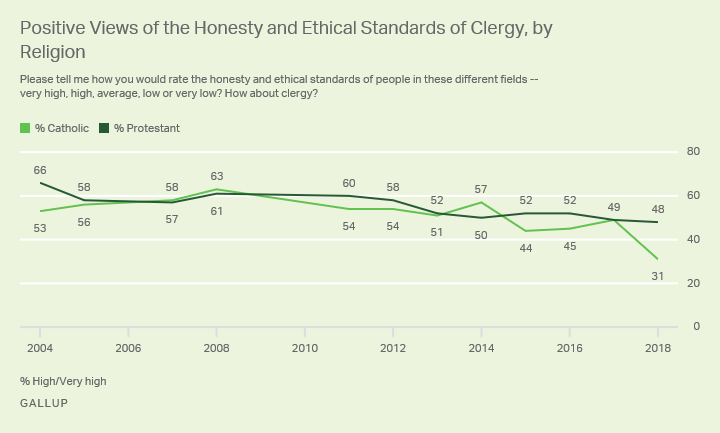
Gallup has measured the public's views about the clergy's ethical standards since 1977 as part of its broader "honesty and ethics of professions" poll. Initially high ratings of the clergy have been declining steadily among all adults since 2012.
The latest findings, from a Dec. 3-12 Gallup poll, come after a Pennsylvania Grand Jury report in August detailed accusations of sexual abuse involving more than 300 Catholic priests over 70 years. The report indicated that Catholic bishops and other high-ranking church leaders covered up these incidents.
The latest drop in Catholics' positive views of the clergy's ethics, from 49% to 31%, is the second double-digit drop since 2004. Both declines were clearly associated with scandals in the Catholic Church even though the question about clergy does not specify a denomination.
Between 2004 and 2014, a majority of Catholics rated the clergy's ethics highly, but opinions fell sharply between 2014 and 2015. That 13-point drop from 57% to 44% followed the release of a study by the Catholic Church that found more than 4,000 priests had faced sexual abuse accusations in the prior 50 years.
Although Protestants' ratings of the clergy have dropped since 2004, the decline has not been as sharp, and the latest 48% positive rating of the clergy is much higher than Catholics'. Still, it is the first reading that falls below the majority level among Protestants.
Catholics' Confidence in the Church Is Failing
Catholics' confidence in the church/organized religion, as measured by Gallup's annual Confidence in Institutions poll in June, was in decline even before the latest sexual abuse allegations in Pennsylvania came to light. Catholics' confidence dropped from 52% in June 2017 to 44% in June 2018.
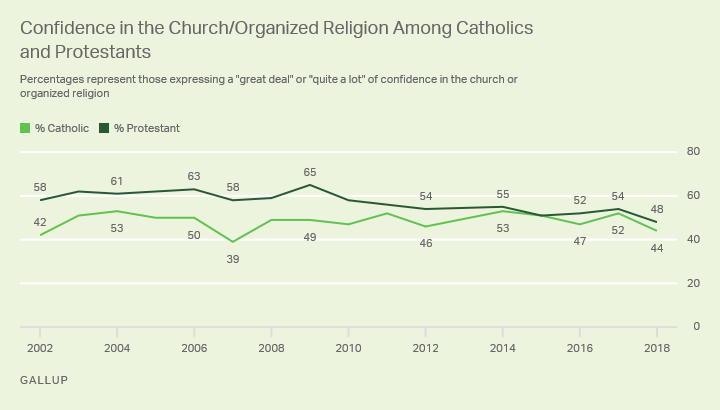
Nationally, the church/organized religion, which had been the top-rated institution from 1973 to 1985, hit an all-time low in confidence of 38% among all adults in 2018. Protestants' confidence in the church declined like Catholics', dropping from 54% in 2017 to 48% in 2018.
Catholics' Church Attendance Is Down
Another bellwether for the possible future of the U.S. Catholic Church is the continued decline in church attendance. Weekly church attendance has declined among all Americans, including U.S. Catholics, in the past decade. Yet, it has remained relatively steady among Protestants.
A previous Gallup analysis showed that between 2014 and 2017, an average 39% of Catholics reported attending church in the last week. That was down from an average of 45% between 2005 and 2008 and from 75% in 1955. The same data showed that for the first time, in the 2014 to 2017 period, no age group reported majority-level weekly Mass attendance. In 2018, an average of 36% of Catholics reported attending church in the past seven days.
These findings come amid a broader trend of more Americans eschewing formal religion. In 2018, Gallup found 20% of Americans saying they did not identify with any religion, a marked change from the 2% recorded 60 years ago.
Rays of Hope for the Catholic Church
Despite these perilous signs for the future of the U.S. Catholic Church, the percentage of Americans who self-identify as Catholic has remained quite stable. The current 22% who identify themselves as Catholic is close to Gallup's 70-year historical average of 25%. Catholic identification has not risen above 29% in Gallup's long history of measuring Americans' religious preferences.
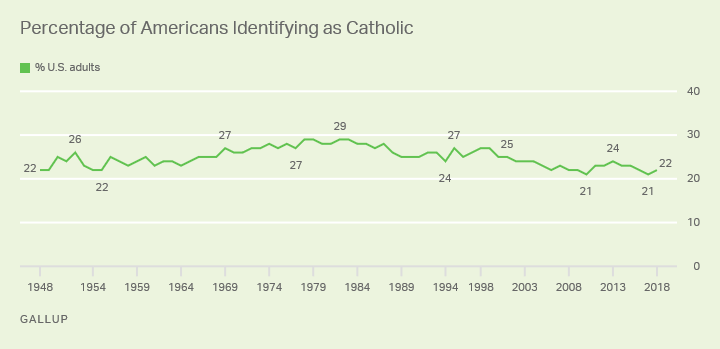
The stability in Catholic identification is notable given the rise in the percentage of Americans who report having no religious identity in recent years. In contrast, Protestant identification has dropped precipitously in the past 10 years.
One key factor behind the stability in Catholic identification has been an increase in the number of Hispanics in the U.S. In 2018, Gallup data showed that Hispanics made up 15% of the U.S. population and 30% of all U.S. Catholics. More than four in 10 Hispanics are Catholic.
A majority of Catholics still view religion as "very important" in their lives. The latest 52% who say as much matches the 2001-2018 average for this measure. Americans' attachment to religion has occasionally spiked higher, such as to 64% in December 2012, but the long-term pattern has been one of stability.
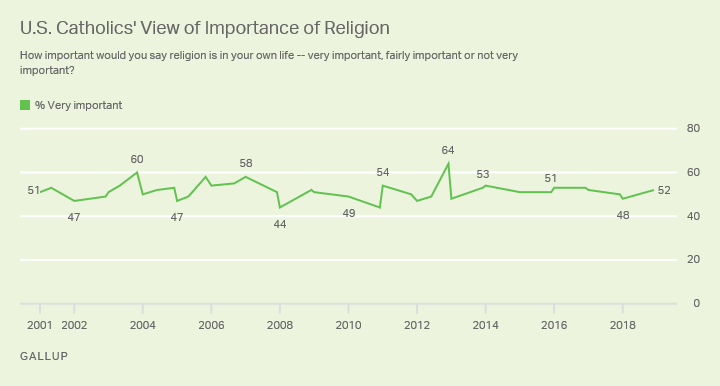
Bottom Line
Since the first high-profile sexual abuse allegations against Catholic priests emerged in 2002 in Boston, many similar cases have rocked the church, and 2018 brought another wave of such charges. Given the sheer breadth of the alleged and confirmed sexual abuse, the erosion of Catholics' views of the clergy's ethical standards is perhaps to be expected. The church's handling of many of these cases undoubtedly weighs heavily on Catholics' minds and likely plays a part in shaping their more increasingly negative views of the church and organized religion as a whole.
In response to this crisis in the Catholic Church, Pope Francis will convene a meeting of Catholic bishops from around the world in February to address the issue. This is the first meeting of its kind, and the pope has said it is "a further step in the Church's efforts to shed full light on the facts." The outcome of that meeting may very well be a deciding factor for many Catholics who are questioning the future of their church.
Still, despite the turmoil, the percentage of Americans who self-identify as Catholic has been stable and a slim majority of Catholics still consider religion to be very important in their lives. That only one-third of Catholics who consider religion very important to them rate the clergy's ethical standards highly seems to show that they are able to separate the institution from their own personal faith.
